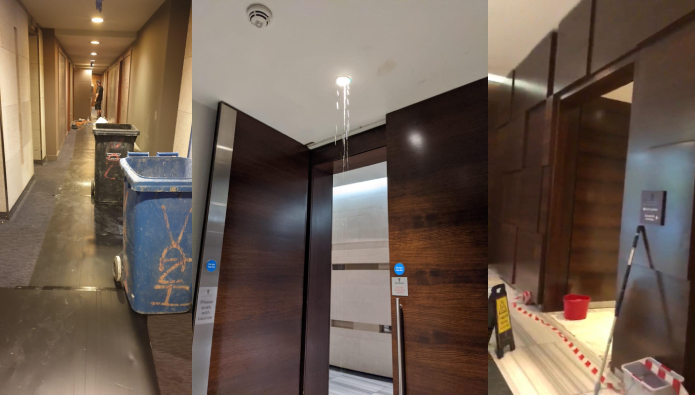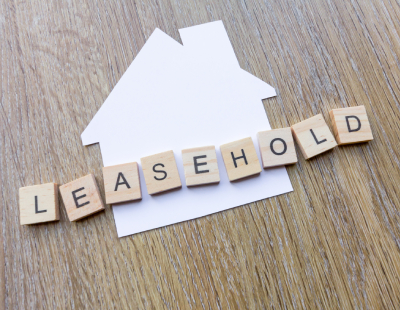One resident at Ballymore's Pan Peninsula development in Canary Wharf has been in touch to complain about the reality of living in a leasehold apartment, with issues surrounding heating, no hot water for weeks, floods in the lobby, leaking lights, and failed balcony cladding leaving residents unable to sell.
The occupant, who goes under the Twitter handle of Ballymore Disgruntled, said there has been an ongoing dispute over the use of a comfort heating and cooling system. “The system was originally included within our service charge, but this was spun out to a separate bill with a fixed supplier that we cannot challenge or change. This also came with no reduction in the service charge.”
They said that while their monthly bill from the energy supplier – SWEnergy – is usually £65-£80, other tenants have reported varying bills from as low as £20 right up to £250/300. The fees also applied to commercial tenants in the building and were the reason the former Six Senses Spa in the lobby closed down.
“SWEnergy is now the provider of a larger number of other similar contracts across Ballymore developments. When new tenants move in, they are often surprised or disappointed to learn they have to cover the additional charge,” they explained.
Following the events at Grenfell Tower, the building underwent a fire safety review given the height of the residential towers. Although the cladding passed, the building itself failed its external wall fire review (EWS1) due to flammable building materials being used to provide the flooring of all balconies.
Currently, there has been no confirmation of the works, and residents anticipate they will have to meet the remediation cost as a leaseholder.
“We’ve also experienced a major hot water pipes failure resulting in the shutdown of hot water for over four weeks in our tower,” they said.

“Given the ongoing pandemic, the offer of a communal shower that was in the redundant spa resulted in a lot of frustration and questions over whether we had appropriate building management or maintenance. Despite the high service charges, we were told by management that there are very few reserve funds available which again raises questions over appropriate management and who will foot the end cost of major repairs as they have said it would not be treated as an insurance claim.”
According to Ballymore Disgruntled, a similar event occurred in the East Tower of this development in 2018, resulting in portacabin shower blocks being put into the car park.
Having reported these issues, they said it’s become ‘impossible’ to sell. “We were offered a discounted rate of just £125 per month when we first moved in over the first couple of years and have since watched it climb very steeply since (particularly when compared proportionally to our mortgage cost). The gradual decline of services available and the ongoing issues such as fire safety failures and hot water pipe failures make us very concerned about how easy it will be to sell our property. This is of course compounded at the moment by the lack of an EWS1 certificate.”
“Given the high cost of service charge and ground rent, we are finding it a major detractor for any would-be buyer. When considering moving abroad for work we were faced with the harsh reality that we could not rent our property either as the comparative weekly average costs of our development versus other new builds was wildly off.”
When asked about Ballymore’s general customer care, they said: “Ballymore simply don’t care about your issues or concerns and are only focused on marketing the next development at a higher premium. The initial services were reasonable but once the building started to move into general operation, with Ballymore as the property manager, any repairs were extortionately expensive and took a long time to arrange.”
However, when approached by PIT, Ballymore strongly refuted many of the claims made against the development. “In terms of customer service, Pan Peninsula enjoys a dedicated on-site management team, in addition to both a concierge service and leisure receptionist,” it said. “In relation to property management, there is a dedicated health and safety lead, an energy and sustainability manager, plus a centralised facilities team who provide oversight across our portfolio.”
It added that the use of a comfort heating and cooling system is a sustainable way of generating heat and power, consistent with government guidance on new housing developments ‘because it is a safer alternative than supplying gas direct to each apartment’. Pan Peninsula has 765 apartments in total.
“It is typical for a single heat billing provider to be appointed by the freeholder to carry out billing activities to the residents,” Ballymore added. “Since the energy is generated via the landlord’s energy centre (and not available from the open market - like electricity) it is not possible for residents to select an alternative billing provider. This is made known to leaseholders as part of their conveyancing pack.”
On cladding, it said it conducted extensive intrusive surveys of the building’s external wall system throughout the summer, in line with government guidance, which is now complete. “The fire engineer has concluded that, while the cladding system in place is appropriate, remedial works may be required to balconies, and a design and tender process for these works is already underway. We anticipate that the cost of these works will be met by the development’s reserve fund which should satisfy lenders’ requirements.”
Ballymore insists it has been in regular dialogue with affected leaseholders throughout to keep them informed of the process. “No interim fire safety measures are required during these remedial works, and we expect a ‘pass’ on the EWS1 form upon completion of the works.”
It admits there have been issues with pipe works and hot water at the development in recent years, including a pipe rupture in Pan Peninsula East Tower in July 2018, which has led to regular maintenance and two inspections.
“The second inspection was conducted at the beginning of August and revealed a risk of failure linked to pipe thickness and fracture in the hot water pipes of the West Tower,” Ballymore stated.
“As a result, the hot water service in this area of the estate was swiftly isolated in order to mitigate the risk of any damage. A burst pipe would have resulted in flooding and could cause significant damage to apartments and property in the West Tower. We recognise the significant disruption this caused leaseholders, but these were emergency works and had to be carried out immediately.”
The developer said the pool and gym were closed due to coronavirus guidelines, and the gym has recently reopened again. “The pool plant was due for maintenance, and so we have taken this time to start these works and some minor repairs to the lighting for which the pool had to be closed in order to carry these out. It’s an 18-week programme which is underway,” it explained.
It said the rumours of a rooftop bar being turned into an office were false and said ground rent rises were out of its control and not in the company’s ownership. Any ground rent increases are known to leaseholders at point of purchase and are within the usual parameters, it added.
Lastly, it explained that its service charges include insurance, utilities and staffing costs - all of which increase year-on-year. This has particularly been the case for insurance, for which the industry has seen a significant rise in premiums.
“The service charge also covers a reserve fund for major works which protects leaseholder’s value. Suppliers are competitively tendered, and we routinely look for the best value in all endeavours,” it said.





/MichaelGove-400x310.jpg)
/MichaelGove2-400x310.png)



.png)

.jpg)
.png)









Join the conversation
Jump to latest comment and add your reply
Who wrote this? The article heading is very misleading. These issues have nothing to do with the tenure of the property!! It should say "Thinkinh of investing in a flat within a modern & large apartment block you may want to think again".
Are ground rents and service charges not to do with a leasehold? Most leaseholds also are flats in apartment blocks, are they not?
The article is doesn't concentrate on ground rent, these are largely nominal and fixed in a lease.
It talks about high costs of living and maintaining these large apartment blocks. The lay person sees this as high service charges, which all go towards paying for upkeep. People pay service charge across every single type of tenure across the world - sometimes by a different name - but it is the same concept. Therefore, the tenure is irrelevant to the article.
With experience, only buy leasehold if there is a management company which is owned by the tenants and which also owns the freehold. By this I mean the leaseholders, NOT tenants sub letting from the leaseholders. There is a legal right for people owning the sub leases to get together and collectively buy the freehold at reasonable cost. In reality this is something that must be done. You are mad if you don't.
There is absolutely no news at all in this article. House builders and "investors" have been screwing tenants all over the world in this way since forever. I might add that a conveyancer or solicitor is failing badly if they don't inform you when you buy leasehold.
There is some news in another article in this edition about the changing value of ground rents with reducing leases and leasehold periods. If you read that carefully it will mesh with the way leaseholders are being treated in this article.
Contrary to what @jasonmorrello says above, this article has everything to do with leasehold tenure.
Regardless of whether it is an older apartment block or the modern apartment block mentioned (or houses) leasehold is archaic legalised extortion with the law heavily weighted in favour of freeholders, and has been exploited by developers to earn obscene bonuses and ground rent investors over the past 15 years or so, at the expense of leaseholders. Hence the scandal we see today #NationalLeaseholdCampaign.
I would add, again contrary to what @jasonmorrello says, ground rents are not "largely nominal and fixed in a lease".
Leasehold law has allowed developers to set high ground rents which can double at e.g. every 5 years over the term of the lease... £350 becomes £700 becomes £1400 becomes £2800... after just 15 years. If you thought compound interest was magic, this is mystical... and obscene! Also, if the annual ground rent is over £1000 in London (not unusual) or £250 outside London (again, not unusual for newer builds) the Lease effectively becomes an Assured Shorthold Tenancy Agreement, and as currently provided for in the Housing Act 1988, arrears of rent (including ground rent) provide a mandatory ground for possession. So, if you thought you were buying your home; wrong! You are still renting, but paying a mortgage and every other cost, and you can actually have your home stolen from beneath you by your freeholder.
@louvaldani by all means have a crack at leasehold and ground rents, but this article has the wrong title. Service charge, high costs and issues with modern methods of construction (due to sucessive regulatory failure over the years) are the real problems.
There was a significant amount of work undertaken by the CLG Select Committee on the onerous ground rents you talk of, they stated there were circa 15-18k of them and thats out of a population of 4.3m. A problem sure, but a small one and one that the industry has seemingly resolved in part. It is easy to paint a grim picture when confronted with all the articles out there, there is a very well orchestrated campaing that you have referred to with a hashtag. A vocal minority on a war path.
@fredjones - as long as there is a choice then fine, on large developments you tend to find over 50% of flats are buy to let investments, so I think I know who I would prefer to own the building - a long term investor with an aligned interest, rather than a short term buy to let investor.
Ballymore has virtually admitted in its comments that the Pan building is at severe risk of flooding if a pipe burts. Buyers should have looked into this before committing.
Please login to comment